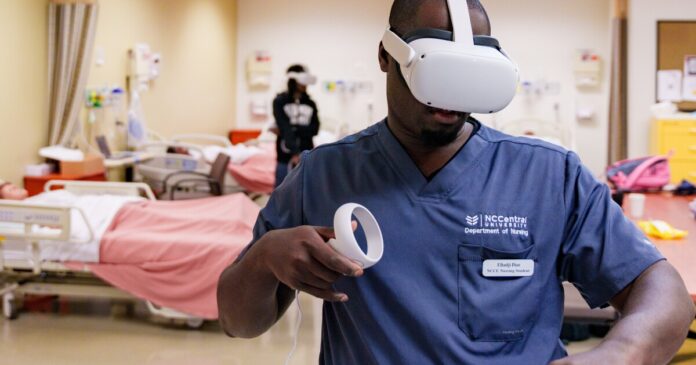North Carolina Central University is using artificial intelligence as a training tool for nursing students.
The training program, called “vrClinicals for Nursing,” started as a virtual-reality hospital simulation. The university began this version as a pilot last summer.
Now, vrClinicals has implemented conversational AI to mimic real patient interactions. It gives nursing students the chance to practice speaking to multiple patients and making healthcare decisions in real time.
Dr. Tina Scott directs experiential learning for N.C. Central’s nursing school. She described the experience their first group of senior nursing students got through the program.
“They were able to take care of four patients, and once they put the headsets on, they actually were inside of a hospital setting, they had to prioritize which patients they wanted to see first, and they had to also develop their plan of care,” she said.
Now, all nursing students in clinical-focused courses have gone through the program. Scott said she’s seen it boost their confidence.
“Having the AI component to the virtual clinic, it actually stretched our students to think and really strengthen that critical thinking, because based on what they said to the patient, the patient responded with some real things that (weren’t) scripted,” Scott said.
Courtesy of North Carolina Central University
Haley Daniels, a nursing student at NCCU, said the program feels comparable to her real-life clinical experiences.
“It felt really hands-on, like something I would see in a clinical,” she said. “I had a patient who had a reaction to an antibiotic, and it’s very similar to a reaction that we could see in real life; like on the AI, she had hives on her chest.”
Daniels noted that some of the simulated patients even have personalities. One virtual patient described being anxious about medication and being in the hospital.
Though she’s had in-person experience, Daniels said the virtual environment continues to prepare her for both the interpersonal and technical aspects of her career.
“I feel like AI is letting us learn how to be comfortable before we actually get into our field,” she said. “So, before I get into my first job, I’ve already had that one-on-one communication with a patient. I’m comfortable with the task that I know I have to do. I’m comfortable with planning out my orders and looking at everything before going into a patient’s room, because I had that practice virtually.”
Scott said NCCU is one of several higher ed institutions across the U.S. using the program. The university currently uses the program in clinical-focused courses but hopes to expand it throughout the nursing school.
Meanwhile, UNC-Chapel Hill has a similar program, where nursing students are using virtual reality to interact with patients.
